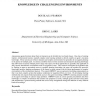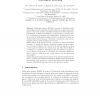458 search results - page 70 / 92 » Q-Decomposition for Reinforcement Learning Agents |
ICALT
2006
IEEE
14 years 1 months ago
2006
IEEE
In this paper, we describe new methodologies for reinforcing the social consensus building of the multicultural coexistence assistance using participatory simulation in civil soci...
IJCNN
2008
IEEE
14 years 2 months ago
2008
IEEE
— When an agent observes its environment, there are two important characteristics of the perceived information. One is the relevance of information and the other is redundancy. T...
ICML
2000
IEEE
14 years 8 months ago
2000
IEEE
Eligibility traces have been shown to speed reinforcement learning, to make it more robust to hidden states, and to provide a link between Monte Carlo and temporal-difference meth...
CI
2005
13 years 7 months ago
2005
Autonomous agents that learn about their environment can be divided into two broad classes. One class of existing learners, reinforcement learners, typically employ weak learning ...
LAMAS
2005
Springer
14 years 1 months ago
2005
Springer
Abstract Multi-agent systems (MASs) is an area of distributed artificial intelligence that emphasizes the joint behaviors of agents with some degree of autonomy and the complexiti...


